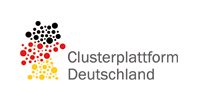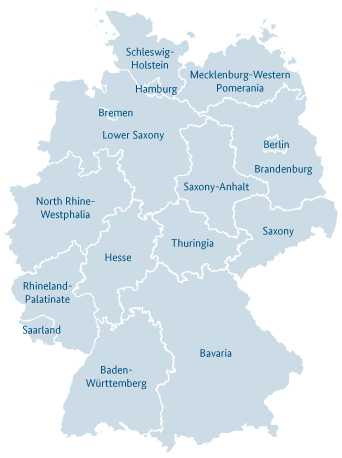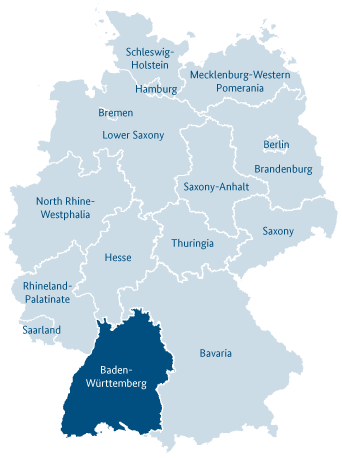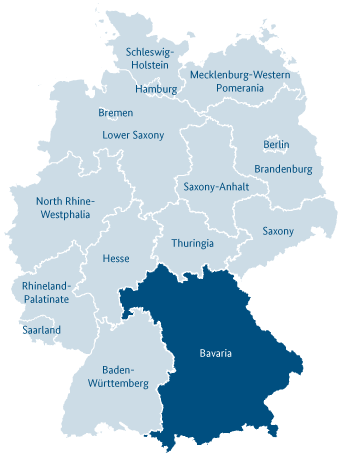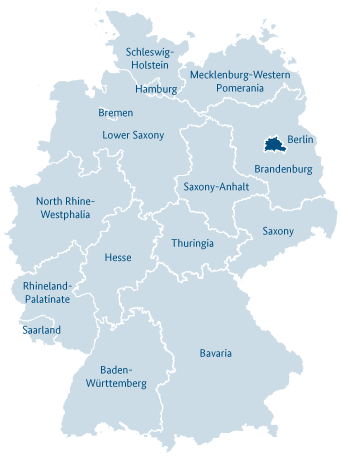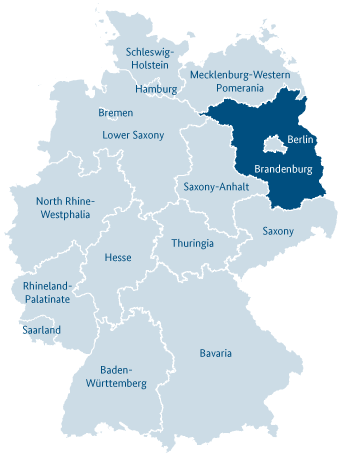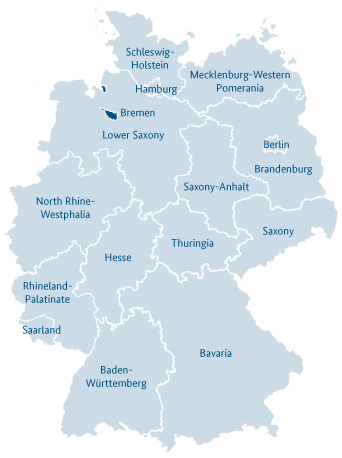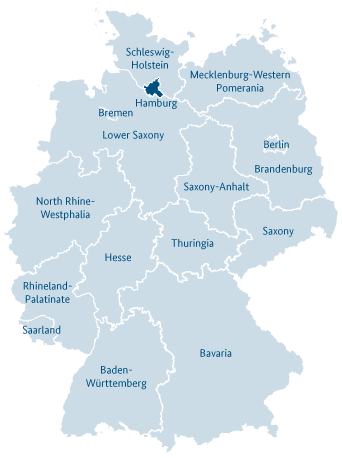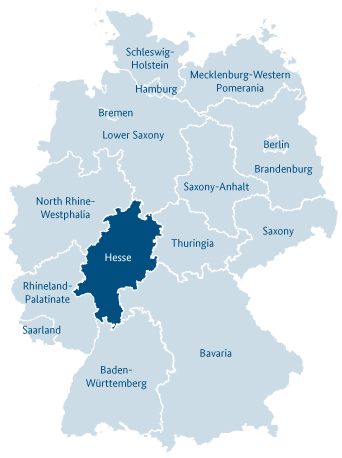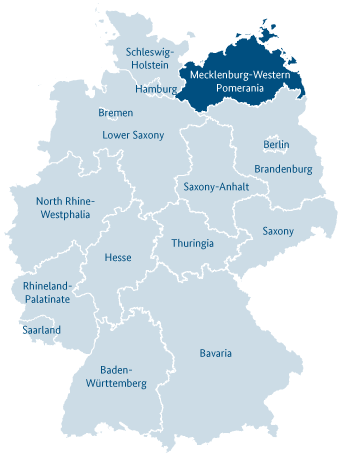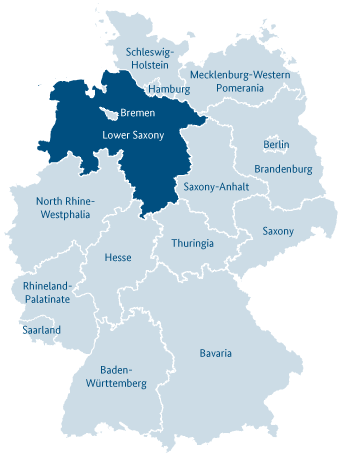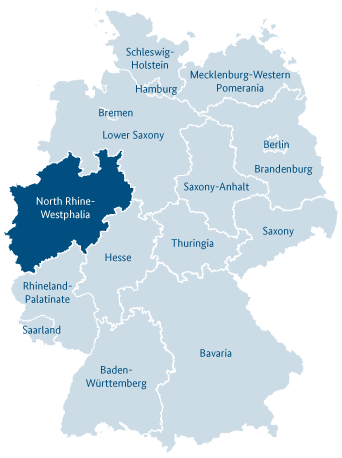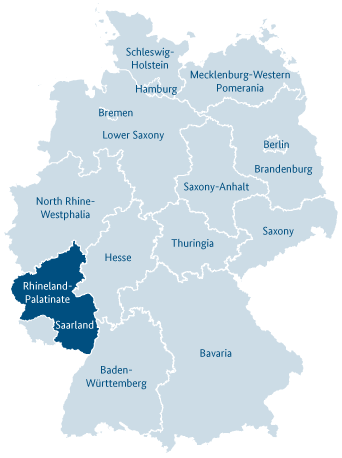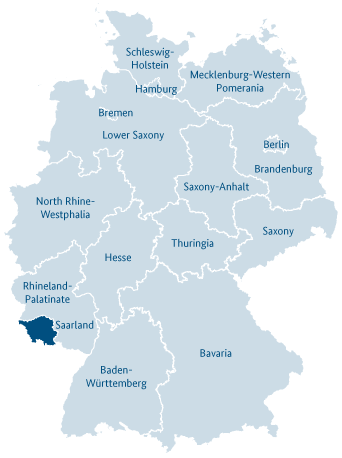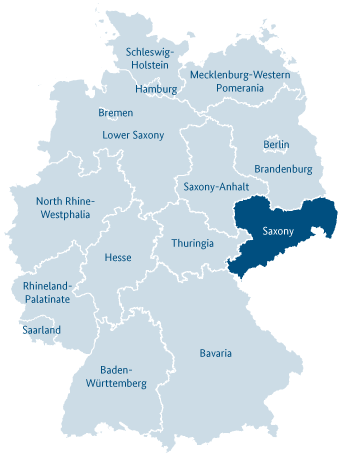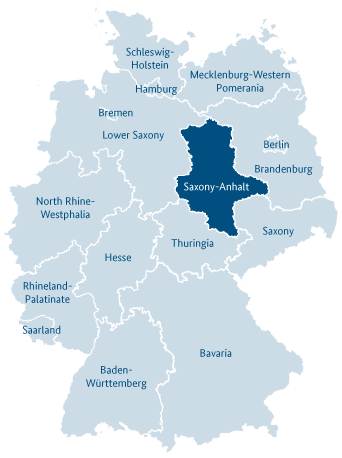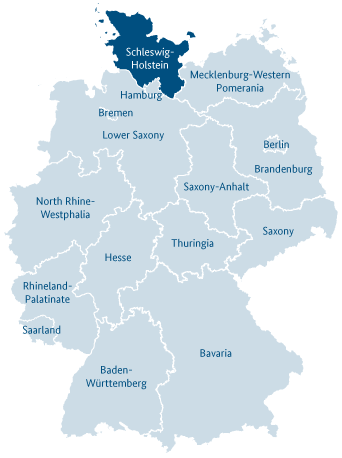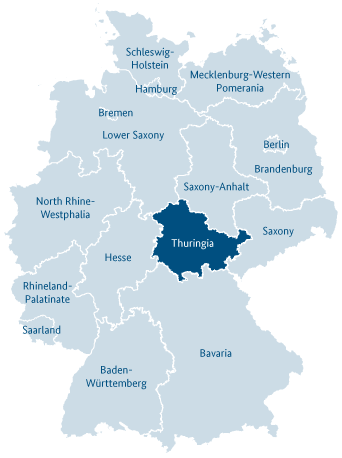To view the cluster programme please choose a federal state.

Baden Wuerttemberg
The state government of Baden-Wuerttemberg systematically supports the development of clusters, cluster initiatives and state-wide networks, which are visible on a regional, national, as well as international level. The “Regional Cluster Atlas Baden-Württemberg” and the cluster database (available on the website of Clusterportal BW) promote transparency. Relevant information is provided through several events and the website "Clusterportal BW".
More: …

Free State of Bavaria
The Free State of Bavaria supports the formation of networks both within science or industry and between science and industry.
More: …

Berlin
The Joint Innovation Strategy of the States of Berlin and Brandenburg (innoBB 2025) was adopted by the two state governments in January 2019. It is the foundation for the continuation of the close economic policy cooperation between the two states in the capital region, which began with innoBB in 2011 as the first interstate innovation strategy.
More: …

Brandenburg
For many years, Brandenburg's economic policy has focused on research, development and innovation. With its regional innovation strategy "innoBB 2025 plus," the state is building on its tried-and-tested innovation policy of recent years and is creating a framework to make Brandenburg's innovation system fit for the major structural economic challenges of the future.
More: …

Free Hanseatic City of Bremen
The Keys to Innovation 2030 - Strategy for Innovation, Services and Industry in the State of Bremen (in short: Innovation Strategy for the State of Bremen 2030) represents Bremen's updated regional innovation strategy for intelligent specialization (RIS3).
More: …

Free and Hanseatic City of Hamburg
The Senate's innovation policy is based on the Hamburg Innovation Alliance (InnovationsAllianz Hamburg), which is run jointly by Hamburg's government, industry and science. The aim of this initiative is to continuously improve the framework conditions for innovation and to establish Hamburg and the metropolitan region among the top European innovation regions.
More: …

Hesse
The goals of research, innovation and technology promotion are to protect the natural basis of life, to secure competitiveness through innovation and to create and maintain future-proof jobs. Hessen Trade & Invest GmbH (HTAI) oversees approximately 40 networks and clusters located in the state.
More: …

Mecklenburg-Western Pomerania
In the past years, viable cluster- and network structures have formed in the most important economic branches and technology sectors in Mecklenburg-Western Pomerania. In part, these have been initiated by network promotion of the federal state and oftentimes not only businesses are involved as partners but also universities and other research institutions.
More: …

Lower Saxony
Research and innovation networks are instruments available to the state to link research and development. An essential component of calls for proposals is that they are open to partners from industry - which leads to networking and cooperation between industry and science.
More: …

North Rhine-Westphalia
In its innovation strategy focused on the lead markets of the future, North Rhine-Westphalia is pursuing the goal of identifying new innovation potential early on, developing existing strengths and creating a social climate that is more conducive to innovation by closely networking all players along the value chain.
More: …

Rhineland-Palatinate
The bundling of knowledge and competencies through thematic and regional networks and clusters is of particular importance for the innovative strength of the state. For this reason, their initiation, monitoring and support are elementary components of Rhineland-Palatinate's innovation policy. The focus is on small and medium-sized enterprises and their role in promising value-added structures.
More: …

Saarland
The services offered by the regional clusters and networks in the Saarland enhance the exchange of knowledge, know-how and knowledge transfer in key areas in regional economic policy contexts and contribute to strengthening the economic performance of the region.
More: …

Free State of Saxony
Europe's leading microelectronics cluster Silicon Saxony, a strong automotive and supplier industry with its Automobile Suppliers Network (AMZ) and a, for the state’s size, considerable number of other networks contribute to keeping Saxony's economy fit for the future by offering new products.
More: …

Saxony-Anhalt
The cluster policy of Saxony-Anhalt focuses on the development of the best possible framework conditions for the activation of clusters and networks.
More: …

Schleswig-Holstein
Through participation in the excellence strategy of the federal and state governments and in the coordinated funding programs of Deutsche Forschungsgemeinschaft (German Research Foundation), Schleswig-Holstein's universities and non-university research institutions are represented in numerous networks.
More: …

Free State of Thuringia
With optics in Jena, Thuringia has a cluster that has grown historically since the 19th century and is internationally significant. For the Free State of Thuringia, the established clusters as well as those under development are important in terms of economic and regional policy, as they promote the growth of value creation and employment.
More: …
